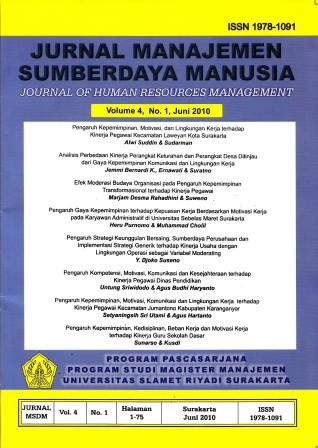PENGARUH KOMPETENSI, MOTIVASI, KOMUNIKASI DAN KESEJAHTERAAN TERHADAP KINERJA PEGAWAI DINAS PENDIDIKAN
Abstract
ABSTRACT
The objective of the research is to analyses (1) to analysing interest influence, motivation, prosperity and communications to employee’s performance, (2) variable the most influencing towards employee’s performance.This research uses population research while the population is all officer in Education Department of Sukoharjo Regency consist of 85 respondents. Data collecting with questionaire technique through validity and reliability test. The data analyse use multiple linear regression and hypothesis test uses t test.The analysis results which could be reported are : (1) The questionnaire of all variables are valid and the variability’s result is reliable, (2) The result of classical assumption test show that the model is no multicolinierity, no heteroskedasticity, no autocorrelation and the residual is normal.The analysis result shows the regression equation is : Y = 4,808 + 0,265 X1 + 0,214 X2 + 0,187 X3 + 0,222 X4 + e; (1) The t test variable of competence, motivation, communication, and welfare with p value 0.000; 0.003; 0.014; and 0.001; so the four independent variables are individually affect to the employee’s performance. (2) Competence variable have most dominant influence to the employee’s performance, because standardized of coefficient regression (b1 = 0,324) are bigger than another variables. (3) Coefficient determination test is Adjusted R2 = 0,474; it means that the competence, motivation, communication, and welfare are explain as 47,4% of the employee’s performance only, further more influenced by the other variables.
Keywords: competence, motivation, communication, welfare, the employee’s performance
Downloads
Published
How to Cite
Issue
Section
License
Authors who publish this journal agree to the following terms:
- Authors retain copyright and grant the journal right of first publication with the work simultaneously licensed under a Creative Commons Attribution License that allows others to share the work with an acknowledgement of the work's authorship and initial publication in this journal.
- Authors can separately make additional contractual arrangements for non-exclusive distribution published by the journal (e.g., publish it in a book), with an acknowledgement of its initial publication in this journal.
- Authors are allowed and encouraged to send their work via online (e.g., in the institutional repositories or their website) after published by the journal.













 Â
 
